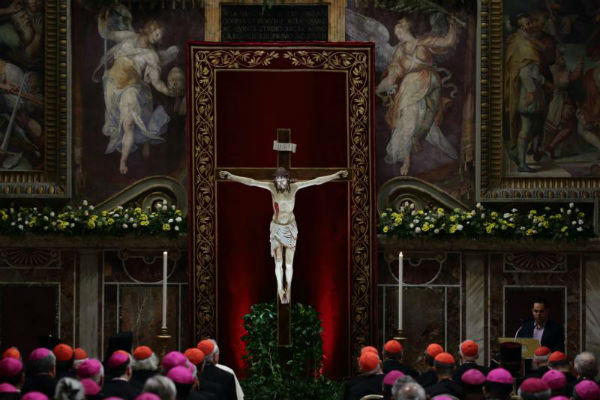
BISHOP PERSICO REFLECTS ON THE ABUSE SUMMIT IN ROME
Anne-Marie Welsh
03/03/2019

Cautious optimism.
Those are the words Bishop Lawrence Persico chose to describe his response to the unprecedented four-day summit Pope Francis called in Rome, Feb. 21-24, 2019. The Holy Father invited the presidents of bishops’ conferences from across the globe to confront the clergy sex abuse crisis, calling it “the evil afflicting the church and humanity.” Opening the meeting with a 21-point list of concrete steps he wanted participants to discuss, Pope Francis said, “The holy People of God expects not simple and predictable condemnations, but concrete and effective measures to be undertaken.”
While many participants and numerous American bishops expressed a degree of hope after the meeting, the reaction from abuse survivors, a number of whom had traveled to the Eternal City to ensure their voices would be heard, generally ranged from disappointment to outrage.
Bishop Persico said he can understand their frustration.
“They have a right to be very angry,” he said. “In their minds, this meeting was just additional delay. Maybe if I was in the same situation, I would be angry too, and irritated.”
And yet, the bishop pointed out, it’s important to remember Pope Francis is dealing with the universal church.
“It’s a large ship,” he said, “and it will take time to turn it around.”
Cardinal Daniel DiNardo, archbishop of the Diocese of Galveston-Houston, participated on behalf of the United States in Rome. But Bishop Persico is in the first of a three-year term representing the bishops of Pennsylvania and New Jersey on the administrative committee of the United States Conference of Catholic Bishops. He will be in Washington, D.C. in early March, where he will help shape the policies and procedures that will be voted on by all of the bishops in the nation during their meeting in June.
Pope Francis began the worldwide summit with a brief presentation followed by the distribution of 21 points for reflection — guidelines culled from dioceses around the world.
“The holy People of God looks to us, and expects from us not simple predictable condemnations,” he said, “but concrete and effective measures to be undertaken.” During the summit, the bishops worked in small groups to review the points which included everything from collaborating with trained experts and strict compliance with both civil and church law, to establishing specific protocols for handling accusations against bishops and accompanying, protecting and providing support for victims.
Bishop Persico said he was pleased to see the range of speakers who addressed the bishops in Rome.
“I’m sure some of the bishops never heard people speak to them so frankly before,” he said. “I thought it was important to help make sure everyone is on the same page.”
Among the speakers was Valentina Alazraki, a Mexican reporter who has covered the Vatican through five papacies. She told the assembly of 190 heads of dioceses that the days of blaming reporters for attacking the church were over. She reminded them that Pope Benedict XVI long-ago admitted “the greatest persecution of the church comes not from external enemies, but arises from sins within the church.”
Alazraki challenged the bishops to commit to transparency.
“Communicating is a fundamental duty,” she said, “because if you fail to do so, you automatically become complicit with the abusers.” She called secrecy “a safety net for those who abuse power.”
Bishop Persico said he feels confident that the Diocese of Erie already has instituted many of the procedures and policies that were discussed in Rome.
"We don’t yet have an official protocol dealing with bishops,” he said, “although certainly if an accusation would come in about me, it would be handled as it is for any other priest.” That topic will be given priority at the June meeting.
The bishop said it was important for Pope Francis to call the international meeting.
“It sends a strong message,” he said. “This is a worldwide problem, and everyone needs to understand it and address it. And I don’t mean just the bishops or the clergy. It’s going to take the People of God to assist them.”
Bishop Persico leaves for a planning meeting with the administrative committee in Washington on March 10.
-
